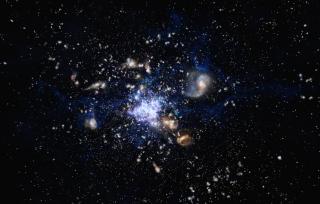Bibcode
Wardlow, J. L.; Cooray, Asantha; Osage, Willow; Bourne, Nathan; Clements, David; Dannerbauer, H.; Dunne, Loretta; Dye, Simon; Eales, Steve; Farrah, Duncan; Furlanetto, Cristina; Ibar, Edo; Ivison, Rob; Maddox, Steve; Michałowski, Michał M.; Riechers, Dominik; Rigopoulou, Dimitra; Scott, Douglas; Smith, Matthew W. L.; Wang, Lingyu; van der Werf, Paul; Valiante, Elisabetta; Valtchanov, Ivan; Verma, Aprajita
Bibliographical reference
The Astrophysical Journal, Volume 837, Issue 1, article id. 12, 20 pp. (2017).
Advertised on:
3
2017
Journal
Citations
50
Refereed citations
42
Description
Submillimeter galaxies (SMGs) at z≳ 1 are luminous in the
far-infrared, and have star formation rates, SFR, of hundreds to
thousands of solar masses per year. However, it is unclear whether they
are true analogs of local ULIRGs or whether the mode of their star
formation is more similar to that in local disk galaxies. We target
these questions by using Herschel-PACS to examine the conditions in the
interstellar medium (ISM) in far-infrared luminous SMGs at z∼
1–4. We present 70–160 μm photometry and spectroscopy of
the [O iv]26 μm, [Fe ii]26 μm, [S iii]33 μm, [Si ii]34 μm,
[O iii]52 μm, [N iii]57 μm, and [O i]63 μm fine-structure lines
and the S(0) and S(1) hydrogen rotational lines in 13 lensed SMGs
identified by their brightness in early Herschel data. Most of the 13
targets are not individually spectroscopically detected; we instead
focus on stacking these spectra with observations of an additional 32
SMGs from the Herschel archive—representing a complete compilation
of PACS spectroscopy of SMGs. We detect [O i]63 μm, [Si ii]34 μm,
and [N iii]57 μm at ≥slant 3σ in the stacked spectra,
determining that the average strengths of these lines relative to the
far-IR continuum are (0.36+/- 0.12)× {10}-3, (0.84+/-
0.17)× {10}-3, and (0.27+/- 0.10)×
{10}-3, respectively. Using the [O iii]52 μm/[N iii]57
μm emission line ratio, we show that SMGs have average gas-phase
metallicities ≳ {Z}ȯ . By using PDR modeling and
combining the new spectral measurements with integrated far-infrared
fluxes and existing [C ii]158 μm data, we show that SMGs have average
gas densities, n, of ∼ {10}1-3 {{cm}}-3 and
FUV field strengths, {G}0∼ {10}2.2-4.5 (in
Habing units: 1.6× {10}-3 {erg} {{cm}}-2
{{{s}}}-1), consistent with both local ULIRGs and lower
luminosity star-forming galaxies.
Herschel is an ESA space observatory with science instruments provided
by European-led Principal Investigator consortia, and important
participation from NASA.
Related projects

Molecular Gas and Dust in Galaxies Across Cosmic Time
Two of the most fundamental questions in astrophysics are the conversion of molecular gas into stars and how this physical process is a function of environments on all scales, ranging from planetary systems, stellar clusters, galaxies to galaxy clusters. The main goal of this internal project is to get insight into the formation and evolution of
Helmut
Dannerbauer